Marine Biology
Course Attendees
Still no participant
Course Reviews
Still no reviews
Course Name : Marine Biology
Code(Credit) : FSEM1205(2-1-0)
Course Objectives
- Marine biology is the study of all aspects of life in the sea and the environment on which it depends. This includes marine plants, animals and other organisms, both vertebrate and invertebrate, in deep oceans, shallow seas and the laboratory.
- The main aims of marine biology are to improve understanding of the marine world and to understand and predict changes in ecosystems affected by human and natural disturbances.
- Marine biology is a broad-ranging career. You could go into field work, academic research, laboratory work, consulting, charity, outreach or policy making.
Learning Outcomes
- In this Course, student will gain basic knowledge of the organisms found in marine waters, and on the interactions between environmental factors and biological processes in aquatic ecosystems
- Food web and energy flow
- Different ecosystems bordering the marine environment
- Diversity of marine organisms
- Animals in relation to physico-chemical properties of the marine environment
Course Syllabus
Theory
Introduction to Marine Biology: Divisions of marine environment- pelagic, benthic, euphotic, aphotic divisions and their subdivisions. Life in oceans - general account of major groups of phytoplankton, sea weeds, major zooplankton groups. Environmental factors affecting life in the oceans-salinity, temperature, light, currents, waves, tides, oxygen, and carbon dioxide. Vertical migration of zooplankton, Phytoplankton-Zooplankton relationship, geographical and seasonal variation in plankton production, plankton and fisheries. Inter tidal ecology: Rocky shore, sandy shore and mud flats, zonations, communities, and the adaptation. Mud banks: formation, characteristics. Estuaries: Classification, Physico-chemical factors, Biota and productivity, examples of some Indian Estuaries. Boring and fouling organisms. Nekton outline, composition of nekton, habitats of nekton. Bioluminescence and indicator species, Blooms, Red tides: cause and effects.
Practicals
Study of common instruments used for collection of phytoplankton, zooplankton and benthos. Collection, preservation and analysis of phytoplankton, zooplankton, sea weeds, Collection preservation and analysis of inter tidal organisms.
Prescribed Books
1. Fincham, A.A. 1984. Basic Marine Biology. British Museum (Natural History), Cambridge University Press, Cambridge, England.
2. Sverdrup, H.U., Martin W. Johnson and Richard, H. Flemming. 1962. The Oceans: Their Physics, Chemistry, and General Biology. Asia Publishing House, Bombay.
Reference Books
1. Ford, Timothy Edgcumbe. 1993. Aquatic Microbiology: An Ecological Approach. Blackwell Scientific Publications, Oxford, London.
2. Levinton, Jeffrey S. 1995. Marine Biology: Function, Biodiversity, Ecology. Oxford University Press, Oxford, England.
Session Plan
Session 1
Theory 1. Marine Environment and its life- Divisions of marine environment
https://www.youtube.com/watch?v=Z8xhciQWL-s&t=101s
1. Marine_environment and its life- Divisions of marine environment
Session 3
Practice 1. Common instruments used to study marine biology
Session 6
Practice 2. Study of instruments used for collection of phytoplankton and zooplankton
Session 8
Theory 6. Influence of Environmental factors on Marine Habitat
Session 9
Practice 3. Study of instruments used for collection of marine benthos
Session 10
Session 11
Theory 8. Geographical variations in productivity
Session 12
Practice 4. Collection, preservation and analysis of plankton
Session 13
Theory 9. Energy flow, Food chain, Food web and ecological Pyramid
Session 15
Practice 5. Study of annelids and coelentarata
https://www.youtube.com/watch?v=6REtN_Mjfb0
https://www.youtube.com/watch?v=J78Ecy0r-gU
Session 18
Practice 6. Study of marine plants and echinodermata
Session 22
Session 23
Session 25
Theory 17. Marine bordered ecosystems- Estuaries
Session 28
Theory 20. Seaweeds
https://www.youtube.com/watch?v=WRwnyQot5go
Fouling and boring organisms
https://www.youtube.com/watch?v=GGlqzQoBpAE&t=22s
Case Studies
Case Studies
Our Main Teachers
School of Fisheries Centurion University of Technology and Management (CUTM) Paralakhemundi- 761211 Odisha, INDIA Cleared ICAR – ASRB NET in FISHERIES RESOURCE MANAGEMENT B.F.Sc. (Fisheries Science)- 2013, College of Fisheries, Mangaluru, Karnataka Veterinary, Animal and Fisheries Sciences University (Bidar), Karnataka, India M.F.Sc. in Department of […]


Recent Comments